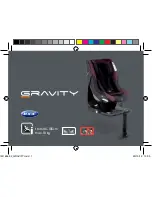
diono.com
radian 3RX
10
11
Rear-Facing:
Harness straps
MUST
be at or just below
the child’s shoulders. Top of head must be 1.5 in. (3.8 cm)
below the top of the car seat shell.
Forward-Facing:
Harness straps
MUST
be just above
the child’s shoulders. Top of child’s ears
MUST
be
below top of car seat shell.
Booster Mode:
Child
MUST
be secured using
ONLY
the
vehicle lap/shoulder belt. Child
MUST
weigh at least 40 lb
(18 kg), with shoulders positioned
at the 4th slot and remain properly
seated for the entire ride. If needed,
adjust the headrest by positioning it
accordingly by sliding it up or down.
SAFE USE CHECKLIST
Choose a suitable location for this child restraint in
your vehicle.
REVIEW VEHICLE SEATING LOCATIONS.
Install this child restraint tightly in your vehicle.
Grab
the sides of the seat where the vehicle seat belt or
LATCH/UAS strap is connected
and slide the child
restraint side-to-side and front-to-back. If the seat
moves less than 1 in. (2.5 cm), it is tight enough.
Secure harness snug and flat on your child.
US EN
NEVER PLACE THIS CHILD RESTRAINT
REAR-FACING IN A VEHICLE SEATING
LOCATION WITH AN ACTIVE FRONT
AIR BAG. DEATH OR SERIOUS INJURY
MAY OCCUR.
If an air bag inflates, it can hit the child or child restraint
with enough force to cause serious injury or death to
your child.
For vehicles with side passenger air bags, refer to your
vehicle owner’s manual for information on your child
restraint installation.
4
According to accident statistics, children are safer
when properly restrained in the rear seating positions
than in the front seating positions.
ALWAYS
install this child restraint in the back seat.
The back seat is the safest place for children 12 and
under. See your vehicle owner’s manual for child
restraint installations and instructions.
NEVER
leave child restraint unsecured in your vehicle
even when it is unoccupied. It could injure other
occupants in a sudden stop or collision.
































